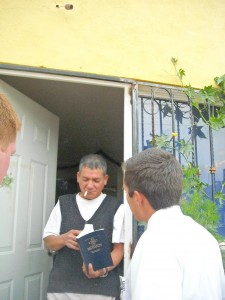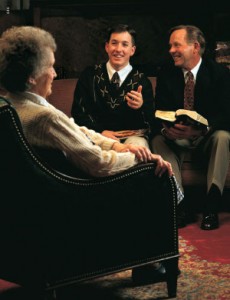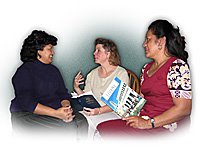In 1830, a young man named Joseph Smith published a book that he claimed was sent from God. That book, the Book of Mormon, contained teachings and prophecies centered on Jesus Christ. It was written for the purpose of “convincing Jew and Gentile that Jesus is the Christ, the Eternal God, manifesting Himself to all nations” (Title Page). It continues to be published to this day and is distributed worldwide in every major language. To me, the Book of Mormon adds an extraordinary amount of spirituality, peace, and insight to my life. It is through the Book of Mormon that I came to understand more clearly the Bible and the role of Jesus Christ.
The Book of Mormon is about a people who left Jerusalem and lost their connection to the prophets of the Bible that lived there. In order to teach this separate people, God called prophets among them. Through their history, each wrote down their own experiences, prophecies and sermons. All the writings were condensed and compiled into a single volume a thousand years later by a prophet named Mormon. That volume, written on gold plates, was buried anciently and retrieved by Joseph Smith by commandment of God. He translated the work though the power of God into English and worked to distribute the book to as many of God’s children as would receive it.
It is through the Book of Mormon that we can more clearly see that Jesus Christ has been known to all of His followers, no matter where or when. The power of the Book of Mormon comes from its witness that Jesus is the savior and redeemer of the world. That witness is given by every one of the prophets in the Book of Mormon. One of those prophets, named Nephi, expressed his reason for writing of Christ.
And we talk of Christ, we rejoice in Christ, we preach of Christ, we prophecy of Christ, and we write according to our prophecies, that our children may know to what source they may look for a remission of their sins (2 Nephi 25:26).
Nephi’s brother, Jacob, expressed similar feelings. “For this intent have we written these things, that they may know that we knew of Christ, and we had a hope of his glory many hundred years before his coming; and not only we ourselves had a hope of his glory, but also all the holy prophets which were before us” (Jacob 4:4).
With such a purpose of this book, it is important to understand clear what it is. I’ve seen that some people refer to our scriptures as the Mormon Bible. This term is confusing because it implies that the Book of Mormon replaces the Holy Bible, which it doesn’t. We believe in and study the Holy Bible (in English, we usually read the King James version) along with the Book of Mormon. The two are inseparably combined and go hand in hand. With both of these resources available, a greater clarity of the scriptures can be understood by those willing to study it out.
For example, in the gospel of Matthew we read that Christ went to John the baptist to be baptized. John realized that if there was anyone ever who never needed baptism for remission of sins, it was Jesus. Yet Jesus was supposed to be baptized, saying, “Suffer it to be so now: for thus it becometh us to fulfil all righteousness” (Matthew 3:15). What exactly does it mean “to fulfill all righteousness”? A prophet from the Book of Mormon explains it for us: “And now, I would ask of you, my beloved brethren, wherein the Lamb of God did fulfil all righteousness in being baptized by water? Know ye not that he was holy? But notwithstanding he being holy, he showeth unto the children of men that, according to the flesh he humbleth himself before the Father, and witnesseth unto the Father that he would be obedient unto him in keeping his commandments” (2 Nephi 31:6-7). This is just a single example of many such topics. We learn about Christ’s sacrifice and suffering, the priesthood, faith, the purpose of the law and many others in this book.
The Book of Mormon also teaches us that a testimony of Jesus Christ will protect us. It demonstrates very vividly the promise that the Lord has made to His people as He said, “If ye shall keep my commandments, ye shall prosper in the land, but inasmuch as ye do not these things, ye shall be swept off the face of the land.” (See 2 Nephi 1:9-11) This seems to be the overarching theme that is shown by periods of prosperity followed by periods of war and famine, ending ultimately in the complete destruction of a people that had fully rejected Christ in their lives.
In short, every single prophet taught the people about Christ, His mission on earth, His atonement and our eternal indebtedness to Him. They were taught to humble themselves before Him, to learn of Him, to pray to Him, to do His will, and above all, to be as He is. We too can learn the lessons the people of the Book of Mormon were taught, with the added benefit of perspective. Consequences of embracing or leaving behind the gospel of Christ are put in plain view in scripture.
Any way you look at it, the Book of Mormon is phenomenal. In just over 500 pages, a history of a people, spanning about a thousand years, is presented. It is complete with personal stories of its authors, societal issues of an ancient people and above all, prophecy after prophecy and principle after principle relating to our Lord and Savior, Jesus Christ. If you have not yet read it, please do so at your first possible chance.
“Hearken unto these words and believe in Christ; and if ye believe not in these words believe in Christ. And if ye shall believe in Christ ye will believe in these words, for they are the words of Christ, . . . and they teach all men that they should do good. And if they are not the words of Christ, judge ye—for Christ will show unto you, with power and great glory, that they are his words, at the last day.” 2 Nephi 33:10-11
See also: Safety for the Soul by Jeffrey R. Holland







 the Relief Society, and are assigned visiting teachers. These relationships are some of the dearest in my life. Again, at the beginning it may just feel like assigned friends, but there is a real power in having people visit you in your own home, who really care about you. I look forward to their visits every month. They are also assigned by the Relief Society President after receiving inspiration about how to pair up the companions and who to assign them to. I think this is an especially inspired program because of the inherent social needs that women have. We need to talk! We need friends! If we are new to an area, or to the Church, we need someone to sit by at our meetings. We need someone to call if we are stuck sick in bed. And visiting teaching gives a woman 6 possible friends automatically: their companion (who are often the dearest friends of all), the two visiting teachers who come to them, and the three ladies that they visit. And because it is a church-wide system, there doesn’t need to be awkwardness, or worry that we are stepping on someone’s toes. It’s just a lovely way to “fellowship”.
the Relief Society, and are assigned visiting teachers. These relationships are some of the dearest in my life. Again, at the beginning it may just feel like assigned friends, but there is a real power in having people visit you in your own home, who really care about you. I look forward to their visits every month. They are also assigned by the Relief Society President after receiving inspiration about how to pair up the companions and who to assign them to. I think this is an especially inspired program because of the inherent social needs that women have. We need to talk! We need friends! If we are new to an area, or to the Church, we need someone to sit by at our meetings. We need someone to call if we are stuck sick in bed. And visiting teaching gives a woman 6 possible friends automatically: their companion (who are often the dearest friends of all), the two visiting teachers who come to them, and the three ladies that they visit. And because it is a church-wide system, there doesn’t need to be awkwardness, or worry that we are stepping on someone’s toes. It’s just a lovely way to “fellowship”.